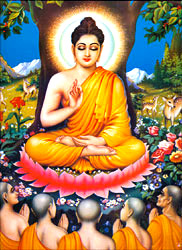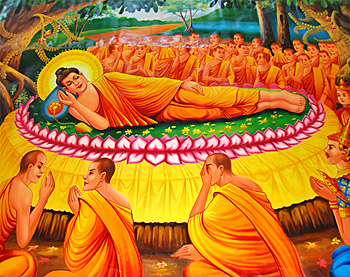 In sramanic philosophy, Nirvana is the state of being free from both suffering and the cycle of rebirth. It is a crucial concept in Buddhism and Jainism. Nirvana is a Sanskrit word, literally meaning "to cease blowing".
In sramanic philosophy, Nirvana is the state of being free from both suffering and the cycle of rebirth. It is a crucial concept in Buddhism and Jainism. Nirvana is a Sanskrit word, literally meaning "to cease blowing".
Buddha described nirvana as the perfect peace of mind that is free from hungering, anger and other distressed states (klesha). This peace, which is in reality the cardinal nature of the mind, is unveiled when the root causes of the distressed states are resolved. The causes themselves lie deep within the mind, but their destruction is gradually achieved by living a regimented life. In Nirvana the root causes of yearning and aversion have been eliminated such that one is no longer subject to human suffering (dukkha) or further states of rebirths in samsara.
Buddha states in the Dhammapada (sometimes translated into English as Path of the Dharma, it is a versified Buddhist scripture, traditionally assigned to the Buddha himself) about nirvana, that it is "the highest happiness". This happiness is rather a persisting, transcendental happiness inbuilt in the calmness attained through enlightenment or bodhi, compared to the happiness of watchful entertainment. The knowledge accompanying nirvana is elucidated through the word bodhi. In Jainism, it means final release from the karmic bondage. When an enlightened human, like an Arhat or a Tirthankara extinguishes his remaining aghatiya karmas (the second type of karma, these do not affect the soul directly, rather, they have an effect on the body that houses the soul) and thus terminates his worldly existence, it is called parinirvana. Technically, the death of an Arhat is called nirvana of Arhat, as he has ended his wordly existence and attained liberation. Moksha, mpre precisely, liberation follows nirvana. An Arhat becomes a siddha, the liberated one, after attaining nirvana.
Buddha explains nirvana as "the unconditioned" (asankhata) mind, a mind that has come to a level of perfect clearness and clarity due to the non-existence of volitional formations. This being is distinguished by the Buddha as "deathlessness" (Pali: amata or amaravati) and as the highest spiritual attainment, the natural result that increases manifold within one who lives a life of virtuous conduct and practise in accordance with the Noble Eightfold Path. Such a life liquifies the causes for future becoming (Sanskrit, karma; Pali, kamma) that otherwise keep beings forever wandering through the impermanent and suffering-generating territories of desire, form, and formlessness, termed samsara.
Nirvana in sutra is never envisaged as a place (such as one might think about heaven), but rather the opposite of samsara which itself is synonymous with ignorance (avidya, Pali avijja). This said:
"`the liberated mind (citta) that nolonger clings` means Nibb?na" (Majjhima Nikaya 2-Att. 4.68).
Nirvana is meant specifically - as relevant with gnosis (the Greek word for knowledge, it means the spiritual knowledge of a saint or enlightened being)- that which ends the individuality of the mind (citta) with empirical phenomena. Doctrinally, Nibb?na is spoken about the mind which "no longer is coming (bhava) and going (vibhava)", but which has attained a status in perpetuity, whereby "liberation (vimutta) can be said".
 It carries further undertones of stilling, cooling, and peace. The realising of nirvana is compared to the ceasing of avidy? (ignorance) which disseminates the will (cetana) into effecting the incarnation of mind into biological or other kind, passing on forever through life after life (samsara). Samsara is caused chiefly by lust and ignorance. Nirvana, then, is not a place or a state, it is an absolute truth to be realised, and a person can do so without dying. When a person who has realised nirvana dies, his death is referred as his parinirvana (Pali: parinibbana), his fully passing away, because his life was his last connection to the cycle of death and rebirth (samsara), and he will not be reborn again. Buddhism upholds that the ultimate goal and termination of samsaric existence (of ever "becoming" and "dying" and never truly being) is realisation of nirvana; what happens to a person after his parinirv?na cannot be explained, as it is outside the perimeters of all conceivable experience.
It carries further undertones of stilling, cooling, and peace. The realising of nirvana is compared to the ceasing of avidy? (ignorance) which disseminates the will (cetana) into effecting the incarnation of mind into biological or other kind, passing on forever through life after life (samsara). Samsara is caused chiefly by lust and ignorance. Nirvana, then, is not a place or a state, it is an absolute truth to be realised, and a person can do so without dying. When a person who has realised nirvana dies, his death is referred as his parinirvana (Pali: parinibbana), his fully passing away, because his life was his last connection to the cycle of death and rebirth (samsara), and he will not be reborn again. Buddhism upholds that the ultimate goal and termination of samsaric existence (of ever "becoming" and "dying" and never truly being) is realisation of nirvana; what happens to a person after his parinirv?na cannot be explained, as it is outside the perimeters of all conceivable experience.
According to Buddhist philosophy nirvana will enable individuals to free themselves from the worldly attachments and in the process help them to rise over moha and maya. Buddha explained, "The whole world is in flames. By what fire is it kindled? By the fire of lust, hatred and ignorance, by the fire of birth, old age, death, pain, lamentation, sorrow, grief and despair it is kindled."
Buddhist philosophy states that nirvana is neither a state of annihilation nor nothingness. It is subha (auspicious), dhuva (eternal) and sukha (happy). Nirvana deviates from the concept of heaven. The state of Nirvana passes through nirodha. Nirodha in Buddhism means breaking away from the false notions of the world and soul, as Buddhism does not believe in the concept of a permanent soul. Buddhism does not profess that nirvana is to be achieved in an afterlife. This is where it sets itself apart form most of the religious philosophies.
When nirvana is realised in this life it is known as sopadisesa nibbana-dhatu. When an arahant attains nirvana after the dissolution of his body then he attains anupadisesa nibbana-dhatu. Nirvana is in many ways similar to the concept of Salvation.



















